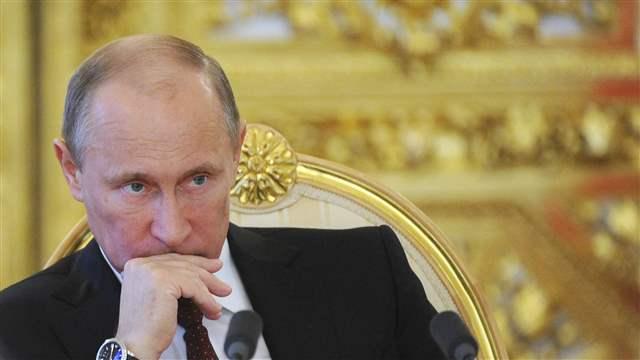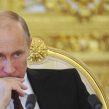
A Defensive Posture and a Feeling of Threat Prevail in Both Moscow and Brussels
Publication: Eurasia Daily Monitor Volume: 12 Issue: 119
By:

Russian President Vladimir Putin has recently committed much time and effort to, on the one hand, intimidate and, on the other, to coax the Western public, businessmen and potential investors into accepting Russia as a benign power that is simply defending its national interests. Putin announced that, in 2015, Russia will procure “40 new intercontinental ballistic missiles [ICBM] capable of penetrating any possible enemy missile defense” (see EDM, June 18). Putin followed this statement up with coercion: “If someone threatens our territories, we will be forced to target our modern attack weapons on the territories from which the threat originates” (Kremlin.ru, June 16). Evgeniy Lukyanov, the deputy secretary of the Russian Security Council, clarified Putin’s threat: “If Poland and Romania agree to deploy [US missile defense interceptor] launchers, aimed at our strategic nuclear forces, we will automatically target them in turn.” According to Lukyanov, there is no threat emanating from Russia that could justify the planned deployment in Europe of an array of US armored brigade-size heavy equipment: “This is a medical case—the leaders of Poland, Romania and the Baltic States must see a doctor—if they want to be targeted, it is their choice” (Interfax, June 24).
At the annual St. Petersburg economic forum, Putin attempted a charm offensive, promoting Russia as a reliable partner and a great business opportunity for Western investors (see EDM, June 22). According to Putin, “Russia is not aggressive, we are only more assertive in defending our interests,” while the Ukrainian crisis is the result of the United States attempting to spread its influence after the end of the Cold War. “In some state of euphoria, they [the US] began to overtake new geopolitical territories they believed were ‘free,’ ” he alleged. Putin listed Washington’s misdeeds: The overthrow and eventual hanging of Saddam Hussein, which resulted in the present Iraqi crisis and the rise of the Islamic State; as well as the bombing of Libya and the overthrow and killing of Muammar Gaddafi, which led to destabilization and the rise of Salafist terrorist groups there. “We do not want the same to happen in Syria,” added Putin, “But they [the United States] want to do it in Ukraine too.” Putin once again reiterated: “I always believed and continue today despite anything—Ukrainians and Russians are one people [narod], the same ethnicity with a common history and culture and religion. No matter what, in the end, Ukraine and Russia are condemned [sic] to a common future” (Kremlin.ru, June 19). Putin continues to think of Ukraine as an integral part of the Russian World (Russkiy Mir), which means the Kremlin’s long-term strategic goals have not changed: A pro-Western Ukraine separate from Russia is an abomination that must be stopped.
After the president spoke, two of his close former KGB colleagues and present-day high-level associates—Sergei Ivanov, the chief of the Kremlin administration, and Security Council Secretary Nikolai Patrushev—followed up with extended interviews explaining, in blunt terms, Moscow’s take on the nature of the conflict in Ukraine and overall standoff with the West. Ivanov gave an interview to the Financial Times (FT, June 21), but his colorful speech lost its edge in translation. Ivanov insisted Russia has no intention of unleashing a war with the North Atlantic Treaty Organization (NATO), which would be “suicidal” since NATO members’ combined defense budgets are much bigger than Russia’s and their combined militaries are equally overwhelming. Ivanov compared NATO to an elephant and a behemoth (the Russian term for hippopotamus), while Russia is “a pug and a house cat.”
In extracts of Ivanov’s remarks in the original Russian, published by Interfax, the wording is much stronger: “Slon [elephant] and Mosyka” (Interfax, June 21)—a well-known Russian proverb, dating from the 19th century and used to define senseless arrogance. “Slon and Mosyka” describes a small, ugly and pompous dog barking at a circus elephant paraded through a town street. The elephant does not notice the dog, but bystanders exclaim: “Mosyka must be mighty, since it barks at the elephant.” Comparing Putin’s Russia with a “Mosyka” is self-deprecating, but Ivanov’s message is clear: Russia is not the aggressor—it is weak, puffed up and vulnerable, and it must defend itself against vicious odds. Ivanov told Interfax that it is symbolic that the European Union extended the duration of sanctions imposed on Russia for its role in the Ukrainian crisis on June 22—the 74th anniversary of Nazi Germany’s invasion of the Soviet Union (Interfax, June 22). The Russian foreign ministry denounced the EU sanctions extension on June 22 as “cynical” and a victory of “the Russophobe lobby” in Europe (Interfax, June 22).
According to Patrushev, the United States wants to destroy Russia to take over its territory to exploit its natural riches—oil, gas, metals. Russia cannot stop Russian volunteers from going to Ukraine’s eastern region of Donbas to fight for the rebels, because it is an honorable cause. European countries do not want to oppose Russia over Ukraine and are ready to accept the Russian takeover of Crimea, but the US is intimidating the docile Europeans. According to Patrushev, the present Ukrainian crisis was engendered by the US as part of a world-wide conspiracy to destroy Russia as an independent state (Kommersant, June 22).
The Kremlin seems to believe it is threatened and must defend itself against mortal danger. On the other side of the divide, this attitude is mirrored: the Russian takeover of Crimea and its involvement in the Donbas fighting is seen as threatening overall security and stability in Europe. In response to a question posed by Jamestown in Brussels, NATO Secretary General Jens Stoltenberg summarized the dominant Western opinion: “There can be no doubt that Russia is responsible for aggressive actions in Europe. And that’s the reason why we, NATO, are responding in a defensive way” (Nato.int, June 24).
Irrespective of the true reality of the situation, both sides believe they are on the defensive and under threat. Neither side is really talking about substance anymore, but only exchanging barbs and accusations in the true spirit of the Cold War that had ended with the collapse of the Berlin wall in 1989. Both sides say they will not be dragged into a new arms race and what is happening is not a new cold war. Indeed, the Cold War was comfortably cold in Europe, while around the globe it was quite hot, with constant proxy wars in Asia, Africa and Latin America taking a bloody toll. Now the fighting has reached Europe in Eastern Ukraine. A vicious cycle of response to a response to a response is forming on the continent that has a clear potential to escalate.




